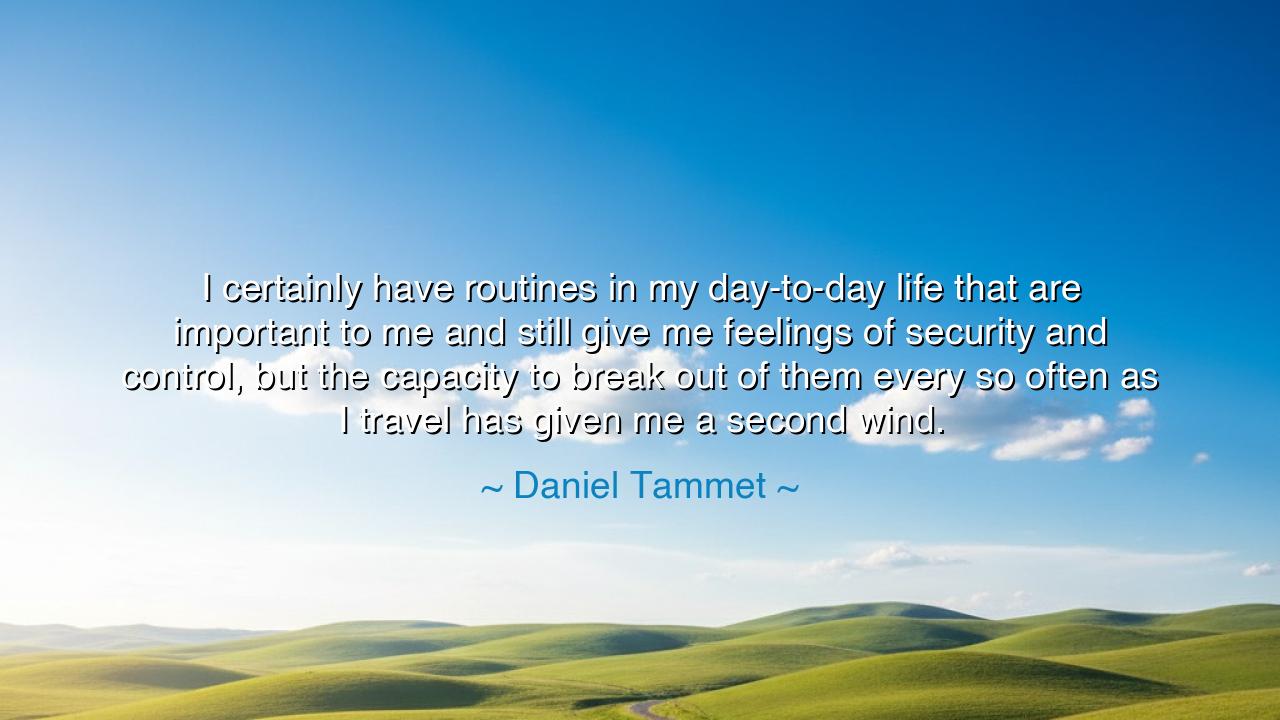
I certainly have routines in my day-to-day life that are
I certainly have routines in my day-to-day life that are important to me and still give me feelings of security and control, but the capacity to break out of them every so often as I travel has given me a second wind.






Daniel Tammet, a man whose mind is both a wonder and a mystery, once revealed a truth that speaks to all who seek balance in life: “I certainly have routines in my day-to-day life that are important to me and still give me feelings of security and control, but the capacity to break out of them every so often as I travel has given me a second wind.” In this utterance lies the eternal dance between order and freedom, between the anchor that steadies us and the wind that drives us forward.
When Tammet speaks of routines, he points to the quiet rhythms that shape our days: the familiar rising, the daily tasks, the repeated patterns that give us a sense of security and control. These routines are not chains but shelters, for without them the chaos of life would overwhelm us. From the farmer tending his fields to the scholar at his desk, all men and women rely on habits that ground them. Yet Tammet reminds us that while routines sustain, they also limit, and too much safety can leave the soul weary.
Thus, he honors the power of travel—the art of stepping beyond the familiar, breaking the circle of routine, and exposing oneself to new sights, new people, new ways of being. Travel is not only movement through space but liberation of the mind. In foreign lands, our eyes are opened, our assumptions challenged, our senses awakened. Tammet calls this liberation his “second wind”—a renewal of energy, as though the spirit, once dulled by repetition, suddenly inhales the freshness of life again.
History teaches us the same lesson. Consider Ibn Battuta, the great traveler of the 14th century. A man of routine devotion to his faith, he also felt compelled to journey beyond his home in Morocco, crossing deserts, mountains, and seas. His travels refreshed not only his spirit but the knowledge of generations, for he returned with stories of distant lands that expanded the imagination of his people. His life was proof that discipline and adventure are not enemies, but companions that enrich one another.
Or think of the Roman general Julius Caesar, a man trained in order and routine through years of military discipline. Yet it was his ventures across the Rhine and into Gaul that gave him new strength and vision. Each campaign, each new land, became not only conquest but renewal. Just as Tammet speaks of finding a “second wind,” so too did Caesar find in breaking routine the energy to shape his destiny.
The deeper meaning of Tammet’s words is that we must hold both anchors and sails in life. Routines give us grounding; without them, we are adrift. But breaking free of them from time to time gives us the vitality to continue the journey. Too much order suffocates, too much freedom exhausts. The art of living lies in weaving the two together: the comfort of rhythm and the fire of adventure.
So, O listener, take this lesson to heart: build routines that give you stability, but do not let them harden into walls. From time to time, step beyond them. Travel if you can—across countries, across cultures, across the landscapes of the unknown. And if travel is not possible, then break routine in small ways: take a different path, read a new book, taste unfamiliar food. For in these moments of change, you will discover your second wind, the breath that restores your spirit and makes life once more a journey of wonder.
Thus, let Daniel Tammet’s wisdom guide you: embrace routine, but embrace also the power to leave it. In this balance lies renewal, strength, and joy, a life both secure and endlessly alive.






AAdministratorAdministrator
Welcome, honored guests. Please leave a comment, we will respond soon